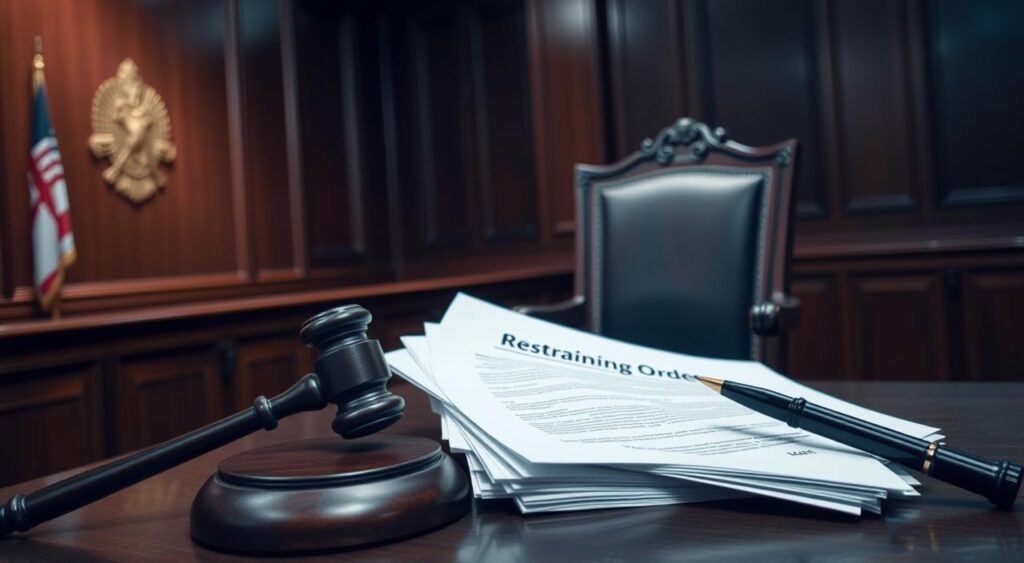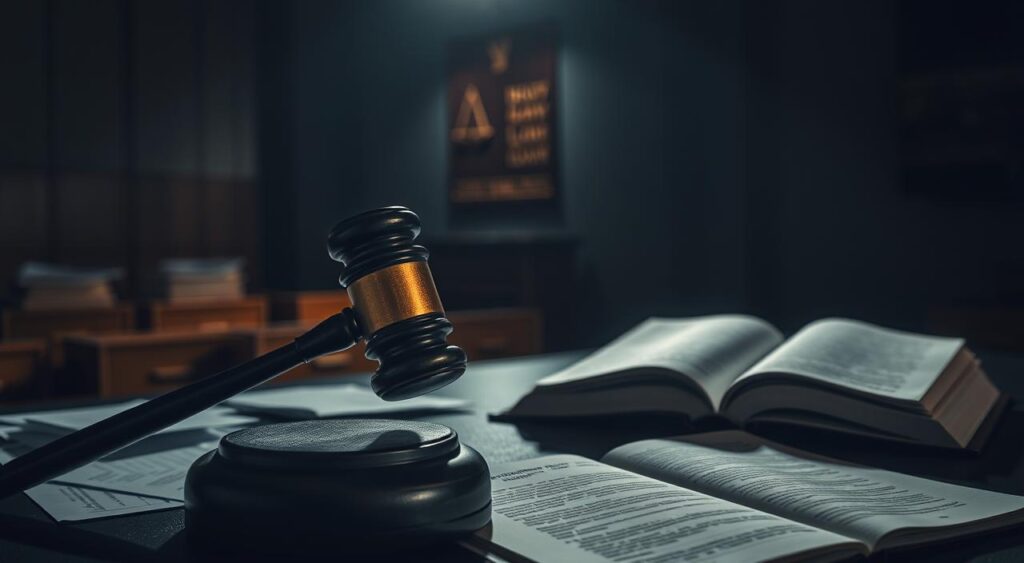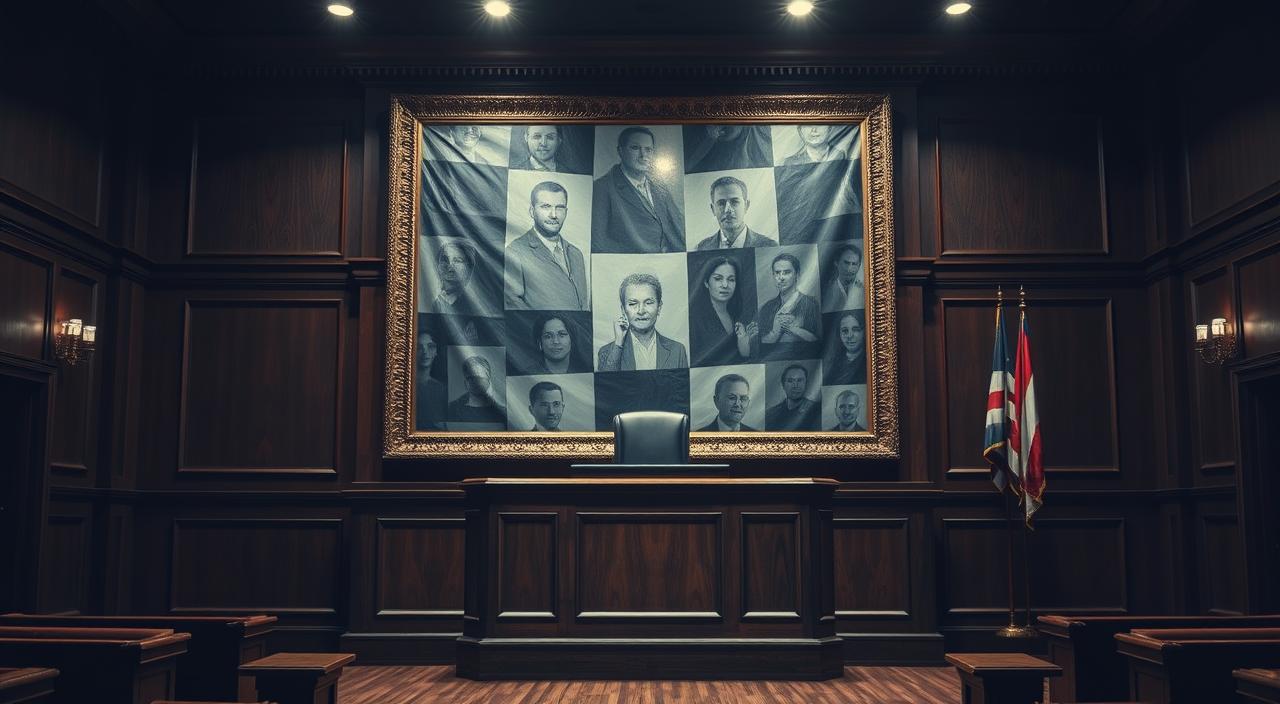I’ve been through narcissistic abuse, and it’s incredibly damaging. It makes you feel lost and unsure of what’s real1. But, there’s a way out. By learning about narcissistic abuse and how to deal with the legal system, we can fight back and take back our lives.
This guide will help you understand how to prove narcissistic abuse in court1. We’ll cover how to collect important evidence and work with experts. We’ll walk through the legal process together, making sure your voice is heard.
Key Takeaways
- Narcissistic abuse is a form of psychological manipulation and control that can have severe emotional, psychological, and even physical consequences for victims1.
- Proving narcissistic abuse in court can be challenging due to the covert nature of the abuse and the manipulative tactics employed by abusers1.
- Gathering evidence, including documentation, communications, and witness statements, is crucial for building a strong legal case1.
- Working with a lawyer experienced in handling narcissistic abuse cases can significantly improve the chances of success in the legal system1.
- Understanding common narcissistic abuse tactics, such as gaslighting and smear campaigns, can help victims navigate the legal process more effectively12.
Understanding Narcissistic Abuse
What is Narcissistic Abuse?
Narcissistic abuse is a form of emotional and psychological manipulation. It is done by people with narcissistic personality disorder3. These abusers think they are more important than everyone else and need constant praise3.
They hurt their victims by using gaslighting, intimidation, and emotional blackmail. This helps them keep control3.
Cycles of Narcissistic Abuse
The cycle of narcissistic abuse has three main phases: idealization, devaluation, and discarding4. In the idealization phase, the narcissist gives the victim lots of attention and praise, known as “love bombing.”4
Then, in the devaluation phase, the victim’s self-worth is slowly broken down. This is done through gaslighting, emotional blackmail, and attacks on their character4. The final stage, discarding, happens when the narcissist no longer needs the victim. This can lead to emotional or physical abandonment4.
Victims often find it hard to see the abuse because of the narcissist’s charm and manipulation4. This cycle can cause serious mental health problems, self-blame, and confusion4.
“The behavior of narcissistic abusers can lead to devastating effects on the mental health and emotional well-being of their victims.”
Documenting the Abuse
When dealing with a narcissistic abuser, keeping detailed records is key to winning your case in court5. The National Domestic Violence Hotline says 63% of abuse victims find it hard to focus at work because of the abuse5. Also, about 41% of victims develop PTSD symptoms from the abuse5. Sadly, 70% of victims don’t tell the police, making it even more important to document everything5.
The Importance of Record-Keeping
Writing down each abuse incident is crucial for justice against a narcissist. Their denial and gaslighting make written proof essential6. Narcissists play games, manipulate, and lie, so having a record shows their true self6.
What to Document
- Keep a journal of abuse incidents, including date, time, and details.
- Save texts, emails, and voicemails that show the abuser’s tactics.
- Get statements from people who have seen the abuse.
Collecting Evidence Discreetly
For your safety, document abuse secretly and store it where the narcissist can’t find or destroy it6. Use a special email for this and back up your data often in different places6. Be careful because narcissists can get angry quickly when criticized6.
By carefully documenting abuse, you can build a strong case for court6. Writing down interactions with a narcissistic ex shows their lies and manipulation6. Witnesses who have seen their behavior also help your case6.
“Documenting evidence is crucial in cases against narcissistic individuals.”
With the right steps, you can fight the legal system and make your abuser accountable6. It’s a tough journey, but documenting abuse well can help you win5.
Building Your Case
Dealing with narcissistic abuse in the legal system can feel overwhelming. But, working with a therapist can be a big help. They can confirm your experiences, spot patterns of abuse, and document your case7. Their input is crucial in court and can challenge the narcissist’s defenses.
Working with a Therapist
Getting help from a therapist who knows about narcissistic abuse is key. They can point out the narcissist’s tricks, like gaslighting and emotional control8. With a therapist, you’ll understand the abuse’s impact on your mind and health7. This knowledge can strengthen your case in court.
Getting Expert Witness Testimony
Also, think about getting opinions from other experts, like psychologists or groups that help victims of domestic violence8. Their reports can make your abuse story more believable7. Experts on toxic relationships and narcissistic abuse can also testify, sharing their knowledge on the narcissist’s tactics8.
With a solid case built by mental health pros and experts, you’re more likely to win in court. This way, you can get the justice and peace you’re looking for.

Presenting Evidence Effectively
When you’re in court against a narcissist, how you show your evidence matters a lot. It’s key to organize your files in order to tell a clear story. Show how the narcissist’s behavior, like love bombing and then ignoring you, fits into a pattern9.
Be ready to face the narcissist’s tricks and show them are wrong with facts. They might try to scare you with legal tricks10. But, having solid evidence can break through their false image10.
| Presenting Evidence Effectively | Benefits |
|---|---|
| Chronological timeline of events | Establishes a coherent narrative |
| Highlighting patterns of narcissistic behavior | Reinforces the dynamics at play |
| Anticipating and refuting deflection attempts | Undermines the narcissist’s manipulation tactics |
| Providing documented evidence | Dispels the narcissist’s facade in court |
Working with mental health experts can be a big help during your case9. They can give advice and even testify in court9. Also, joining groups for support can give you a safe place to talk and get advice9.
Finding a lawyer who knows how to deal with narcissists is very important10. Taking care of yourself and setting limits is also key to protect you during this time10.

By showing your evidence well, you can tell a strong story that fights off the narcissist’s tricks. Remember, staying strong and taking care of yourself is just as important as your legal plan.
Legal Options
When facing a narcissistic abuser, getting a restraining order or order of protection is a first step. These documents stop the abuser from contacting or approaching you and your kids11. It’s important to document all incidents and threats to show why you need protection, even if the police didn’t get involved11.
Restraining orders offer crucial protection and can lead to legal trouble for the abuser if they break it11. But, dealing with a narcissist in divorce is hard because they don’t want to give in and might try to trick the courts12. Having a lawyer who knows how to handle narcissistic spouses can really help11.

Mediation is usually suggested in divorce, but it doesn’t work well with narcissists because they like to control and won’t give in12. Talking through an attorney might be the best way to handle false claims and wild accusations from the narcissist12.
Getting a divorce from a narcissist can be very hard on your emotions and wallet12. Getting help from mental health experts can help with the stress and give advice during this tough time12.
Divorce Proceedings
For those experiencing narcissistic abuse in marriage, divorce is often the only way out. It helps you regain your freedom and personal space13. Gathering evidence of abuse is key to winning custody, dividing assets fairly, and proving cruel treatment13. It’s wise to get an attorney who knows about narcissistic abuse to help you use your evidence well13.
Narcissism awareness has grown, helping in divorce cases.13 Divorce coaches for those leaving Narcissistic partners, or “Nex,” stress the court’s handling of such cases13. When facing a Narcissist in court, avoid direct fights. Instead, plan carefully, gather support, and communicate well13.
Narcissists often pretend to be saints while making their partners seem crazy or unstable.13 To deal with Narcissistic abuse in court, stay calm and avoid emotional reactions13. It’s best to document facts and keep emotions in check to ensure the court sees the Narcissist’s true behavior.13
Narcissists might use tricks like making false claims, lying, and finding loopholes to wear down their partners.13 They might also try to exhaust their partners financially and emotionally with endless court battles.13 They might provoke their partners to react, then claim they are the aggressors, especially in court.13
Narcissists might lie, make false accusations, and find legal loopholes to complicate the divorce and distract their partners.13 It’s important to understand how Narcissists use money, children, and communication tactics in divorce13.
Narcissistic personality disorder (NPD) is marked by a lack of empathy, feeling superior, and manipulating others.14 Dealing with a narcissistic spouse can make divorce very stressful and hard on the other person.14 Divorcing a spouse with NPD can lead to a long, tiring, and complex court battle.14
To prove narcissistic abuse in divorce, you need strong evidence.14 Every family law case is different, and judges may not always recognize a narcissist.14 Gathering evidence like communications, journal entries, videos, and other data is helpful.14 Having a good divorce attorney who knows complex cases is key when divorcing a narcissist.14 Support from friends and family is also crucial during a divorce from a narcissist.14

Criminal Charges
Narcissistic abuse can lead to serious crimes like assault, battery, stalking, or financial exploitation15. It’s tough to prosecute these cases, but having proof of abuse can help15. To build a strong case, report every incident to the police and keep detailed records15.
Domestic violence, which includes narcissistic abuse, covers crimes like assault and stalking15. If you’ve been a victim, consider talking to a lawyer or filing a police report15. Knowing your local laws is key, but act fast if you feel unsafe15.
If you’re in danger, call your local emergency number or the National Domestic Violence Hotline at 800.799.SAFE (7233)15. Filing charges against an abuser shows you won’t tolerate violence15. A Victim’s Advocate can help you through the legal process15. While it may not bring closure, it’s a step towards justice15.
Domestic Assault in the 4th Degree means acts that put the victim in fear of physical harm16. Harassment in the Second Degree causes emotional distress without reason16. First Degree Harassment is a felony, causing emotional distress and harm16. Abuse of an elderly person causes emotional distress through repeated actions16.
17 About 6.2% of people have Narcissistic Personality Disorder (NPD), more in men17. Narcissistic behavior can be hard to prove in court17. Narcissists often turn friends and family against their victims17.
17 Most lawyers suggest mediation, but it fails with narcissists17. Documenting everything is key when dealing with a narcissist in court17. Explaining narcissism to the judge is crucial, as many don’t understand it17. Getting help from experts in NPD can be very helpful17.

Civil Lawsuits
Victims of narcissistic abuse might find hope in civil lawsuits. The legal world can seem scary, but lawsuits can help victims get justice. They can also get compensation for the harm they suffered18.
Civil lawsuits have a simpler standard than criminal court. Victims can sue for emotional pain, false accusations, or money taken from them. This is true even if the abuse isn’t serious enough for criminal charges1.
But, proving narcissistic abuse in court is hard. The abuse is often hidden, and the abuser uses tricks like gaslighting. This makes it hard to find solid proof1.
To build a strong case, victims should keep detailed records of the abuse. They should save texts, emails, and other important evidence. Working with a therapist or abuse group can also help. They can provide expert opinions and support2.
Even though the legal fight is tough, civil lawsuits can be a powerful way to seek justice. Victims can make their abusers pay for the emotional, mental, and financial damage1.
Going through the legal system is complex. It’s crucial to find a lawyer who knows about narcissistic abuse cases. With the right plan and evidence, victims can start to heal and get the justice they deserve.
Self-Care During the Process
Going after a narcissistic abuser is very tough on your mind and heart19. They know how to twist things to make you question what’s real19. This is called gas-lighting, a way they emotionally abuse you20. Getting a divorce from one is especially hard on your emotions20. So, taking care of yourself is key during this time.
Dealing with the Emotional Toll
Keep in touch with your loved ones who believe you and join a support group20. Gas-lighting is a common trick used by narcissists during divorce20. Remember to be kind to yourself on tough days.
Creating a Self-Care Toolkit
Make a “self-care toolkit” with strategies that help you feel better when you’re down20. Activities like exercise, meditation, hobbies, and laughter are great for your self-care20. If you’re experiencing psychological abuse, see a therapist who knows about narcissistic abuse20. Taking care of yourself is crucial to facing the narcissist and gaining your freedom.
“Prioritize self-care during this difficult journey. You deserve to feel supported and empowered, not drained and defeated.”
You’re not fighting this alone. Ask for help to face this tough time with strength and kindness.
how to prove narcissistic abuse in court
To prove narcissistic abuse in court, you need a solid plan. Start by documenting everything, like journal entries and messages. Also, record conversations and gather witness statements21. Experts like therapists can help prove your story and fight back against the abuser’s lies1.
It’s important to show the court how the abuser acted unfairly. Keep emails and texts, and record their behavior1. Narcissists often use tricks like gaslighting to control their victims1.
- Narcissistic personality disorder makes people think too highly of themselves and ignore others’ feelings21.
- They use people, even kids, to get what they want and seem nice21.
- Signs include needing lots of praise, putting others down, and being jealous21.
- They get angry when they’re criticized, showing contempt and rage21.
In court, proving narcissistic abuse can be hard. It’s because the abuse is often hidden, and there’s little evidence1. Victims may also face emotional and physical problems like anxiety and PTSD1.
It’s key to know the signs of narcissistic abuse and how to document it1. Getting help from therapists and support groups is important1. Also, having a lawyer who knows about narcissistic abuse cases is crucial1.
In summary, proving narcissistic abuse in court needs careful planning. Collecting solid evidence, getting expert opinions, and having a good lawyer can help survivors win their case.
Defining Narcissism: Traits and Behaviors
Narcissism is more than just being arrogant or vain. It’s a complex disorder with many traits and behaviors22. People with Narcissistic Personality Disorder (NPD) think they are very important. They need lots of attention and admiration. They also lie, have troubled relationships, and don’t care about others’ feelings22.
To be diagnosed with NPD, a person must show five out of nine signs listed in the DSM-522.
22 Narcissistic behavior includes being very grandiose and fantasizing about success. They feel they deserve special treatment and don’t care about others. They also use people for their own gain23.
Narcissists might lie, manipulate, and use loopholes in divorce cases23. They can be very harmful to their children during divorce, thinking they are right because of their own importance23. They might also try to turn their children against the other parent.
23 Narcissistic Abuse is a hidden form of violence that can go unnoticed for years23. It’s often linked to other disorders like bipolar and borderline personality disorders23. There are signs to look for, but no medical test for it23. The biggest warning sign is when someone controls another person.
23 Narcissists often cut their victims off from friends and family before becoming more abusive23. They use gaslighting to make their victims doubt reality23. They might threaten violence, emotionally abuse, or ignore their victims to keep control23. They also use emotional blackmail to keep their victims in line.
“Narcissism is a personality disorder characterized by an inflated sense of self-importance, a deep need for excessive attention and admiration, and a lack of empathy for others. It is a complex and pervasive condition that can have far-reaching consequences in personal and professional relationships.”
Narcissism Impact on Relationships
Narcissistic abuse can severely harm the emotional and psychological health of the non-narcissistic partner24. Narcissists often use the legal system to gain power and control in custody or divorce cases24. This can lead to feelings of worthlessness, anxiety, depression, and PTSD24.
Narcissists start conflicts and drag out legal battles to keep control or punish others24. This causes emotional and financial strain on their opponents.
The manipulative tactics of narcissists can deeply harm their partners24. It’s important to seek support and validation when proving abuse in court24. Narcissists often distort facts to seem like victims, influencing court decisions in their favor24.
They crave admiration and project a perfect image, showing no empathy for others’ emotional pain24.
Narcissists use gaslighting to distort perceptions and make their opponents doubt themselves24. They might also involve a third person to manipulate interactions and gain power24. Having a strong support system is key when facing a narcissist legally24. It’s crucial to gather solid evidence and set boundaries in legal battles to prevent further manipulation24.
Narcissism is a disorder marked by an inflated sense of self-importance and lack of empathy25. In family court, narcissists often discredit ex-partners to manipulate proceedings, especially in child custody cases25. They use smear campaigns to harm others’ reputations, aiming to discredit and turn people against them25.
Narcissists twist facts and portray themselves as victims, leading to unfair outcomes in family court25. They use tactics like false accusations, smear campaigns, and playing the victim25. Victims face gaslighting, triangulation, and emotional manipulation in court25.
To prove character assassination in family court, document interactions, gather witnesses, and hire a lawyer25. It’s important to show false statements, intent, and the harm caused25. Legal professionals need to be aware of narcissistic behavior to ensure fair legal processes25.
Signs of narcissism in family court include a grandiose sense of self-importance and lack of empathy25. To counter smear campaigns, present factual evidence, stay composed, and seek legal and emotional support25.
Conclusion
By learning and using the strategies in this guide, we can start to reclaim our power and hold narcissistic abusers accountable in court2627. We’re not alone in this fight. With the right legal guidance, support, and willpower, we can tackle the legal system and fight for justice.
This article has covered the complex world of narcissistic abuse. We’ve seen how important it is to gather evidence and know our legal options26. By understanding legal terms, using expert witnesses, and presenting our case clearly, we can win in court.
Starting this journey is tough but powerful. Let’s remember that our strength and will are what will help us reclaim our power and make our abusers accountable2627. With the right legal guidance and support, we can overcome the legal hurdles and find justice. This will help us break free from abuse and look forward to a healthier future.
FAQ
What is narcissistic abuse?
Narcissistic abuse is when someone with an inflated sense of self-worth controls and manipulates others. They need constant praise and use tactics like gaslighting to keep control. This behavior is harmful and can be very damaging.
How can I document narcissistic abuse?
Keeping a detailed record of each abuse incident is crucial. Write down what happened, when, and where. Also, save any messages or emails that show the abuser’s manipulation. If you can, get statements from people who have seen the abuse.
How can a therapist help in proving narcissistic abuse?
A therapist can confirm your experiences and help you see patterns of abuse. They can also provide professional documents to support your case. Their opinions are important in court and can challenge the abuser’s defenses.
What types of legal options are available for victims of narcissistic abuse?
Getting a restraining order is a first step to protect yourself. If you’re married to an abuser, divorce might be necessary. Abuse can also be a crime, like assault or financial fraud. You might be able to sue for emotional harm or financial losses.
How can I take care of myself during the legal process?
Fighting against a narcissistic abuser is very tough. Make sure to take care of yourself. Stay close to your loved ones and join a support group. Keep a list of things that help you feel better when you’re down.
Source Links
- Steps to Successfully Prove Narcissistic Abuse in a Legal Setting – https://www.narcissisticabuserehab.com/steps-to-successfully-prove-narcissistic-abuse-in-a-legal-setting/
- How To Prove Narcissistic Abuse In Court: A Legal Guide – https://www.lawfuel.com/how-to-prove-narcissistic-abuse-in-court-a-legal-guide/
- Your Legal Guide to Divorcing a Narcissist – Narcissistic Abuse Explained – https://bartonfamilylaw.com.au/narcissistic-abuse-narcissistic-abuse-personality-disorder/
- Separation from a Narcissist: Legal Strategies & Guidance – https://stewartfamilylaw.com.au/narcissistic-abuse-and-separation/
- A Guide to Building a Case Against a Narcissistic Ex — Joleena Louis Law – https://www.joleenalouislaw.com/blog/a-guide-to-building-a-case-against-a-narcissistic-ex
- Proving your Case Against a Narcissist | Modern Law – https://mymodernlaw.com/proving-your-case-against-a-narcissist/
- How to Prove My Partner’s Narcissism Ended My Marriage – https://www.tpfamilylaw.com/blog/2024/february/how-to-prove-my-partners-narcissism-ended-my-mar/
- How to Destroy a Narcissist in Court: 11 Effective Tips – https://www.wikihow.com/Destroy-a-Narcissist-in-Court
- Court Against a Narcissist | Divorcing Narcissist for Women – https://www.wsm-law.com/court-against-a-narcissist/
- Do judges recognize a narcissist? — Judge Anthony – https://www.judgeanthony.com/blog/do-judges-recognize-a-narcissist
- DiPietro Law Group, PLLC – https://www.dipietropllc.com/fairfax/divorce/divorcing-a-narcissist/
- How To Divorce a Narcissist and Win: Part 3 – https://memphisdivorce.com/divorce/how-to-divorce-a-narcissist-and-win-part-3/
- How the court system handles the Narcissist? – https://www.yourdivorcecoach.org.uk/post/how-the-court-system-handles-the-narcissist
- Tips for Navigating Divorce With a Narcissist – https://wichitadivorceblog.com/2024/03/tips-for-navigating-divorce-with-a-narcissist/
- Can Narcissistic Abuse Be Considered Criminal? – https://medium.com/illumination/can-narcissistic-abuse-be-considered-criminal-9f007c878e7f
- Can You Be Charged With a Criminal Offense for Emotional Abuse? | Baldwin and Vernon – https://baldwinvernon.com/criminal-law/can-you-be-charged-with-a-criminal-offense-for-emotional-abuse/
- How to Deal with a Narcissist in Court Proceedings – Family Law Attorneys | ADZ Law, LLP | San Francisco Bay Area – https://adzlaw.com/family-law/2021/06/11/how-to-deal-with-a-narcissist-in-court-proceedings/
- How Narcissists Use the Courts to Continue Their Abuse – https://psychcentral.com/pro/exhausted-woman/2016/03/how-narcissists-use-the-courts-to-continue-their-abuse
- How To Get A Narcissist To Reveal Themselves – https://www.weinbergerlawgroup.com/blog/divorce-family-law/get-narcissist-reveal/
- Narcissist Divorce Strategies: Tips for a Successful Outcome – Buchanan Law Group – https://www.rbbfirm.com/narcissist-divorce-strategies/
- How to Get a Narcissist to Reveal Themselves – https://www.sachdevfamilylaw.com/blog/how-to-get-a-narcissist-to-reveal-themselves/
- Divorcing a Narcissist: Breaking the Cycle of Coercive Control – https://www.lynchowens.com/blog/2022/october/divorcing-a-narcissist-breaking-the-cycle-of-coe/
- Top 10 Warning Signs of Narcissistic Abuse revealed – https://bartonfamilylaw.com.au/blogs/narcissistic-abuse/top-10-warning-signs-of-narcissistic-abuse-revealed/
- How Do You Annihilate A Narcissist In Court? — Judge Anthony – https://www.judgeanthony.com/blog/how-do-you-annihilate-a-narcissist-in-court
- Narcissism and Character Assassination in Family Court – https://getcourtready.co.uk/blog/narcissism-and-character-assassination-in-family-court
- How To Prove Narcissistic Abuse In court | 15 Ways – https://narcissinsight.com/how-to-prove-narcissistic-abuse-in-court/
- Bridging Victims’ Voices & Legal Language in Narcissistic Abuse – https://www.rebeccazung.com/bridging-victims-voices-legal-language-in-narcissistic-abuse/







